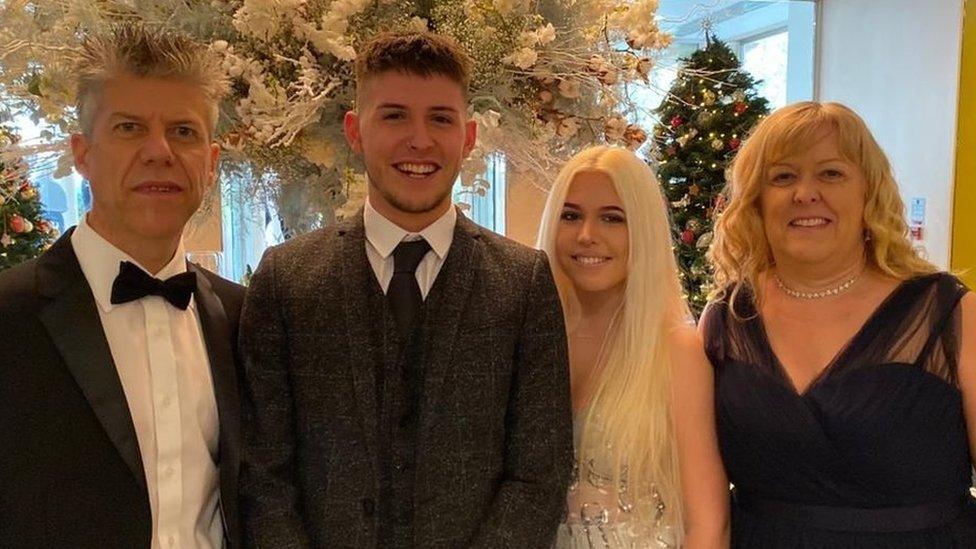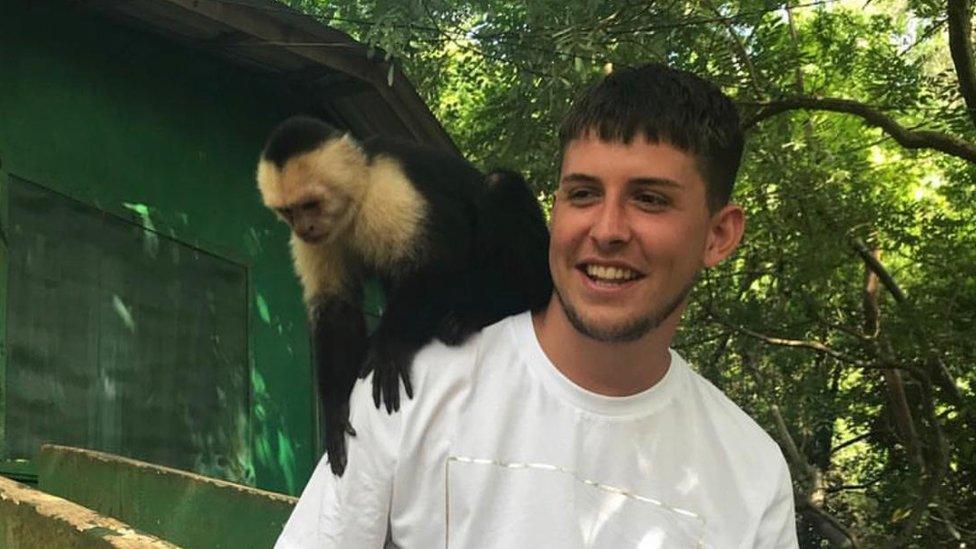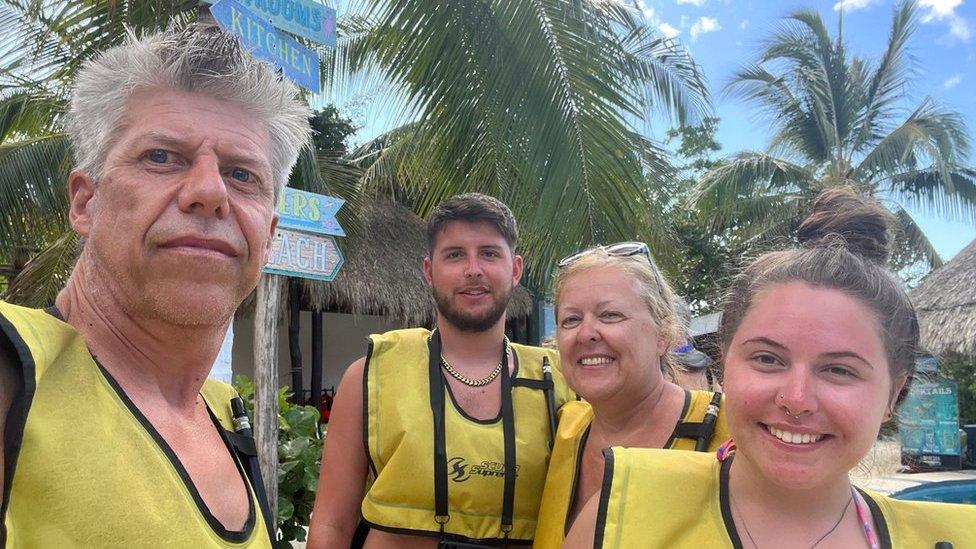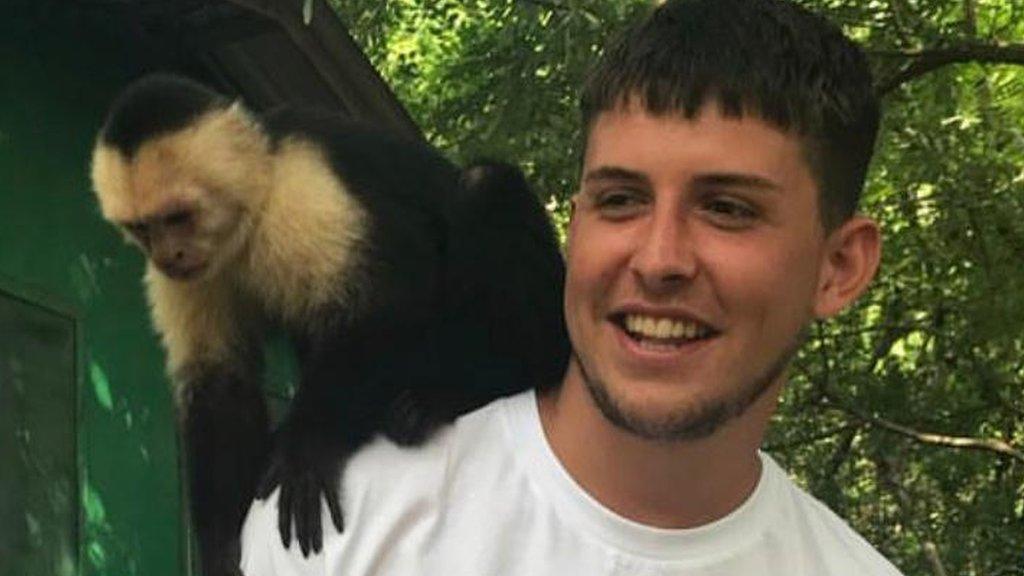Danny Castledine: Questions over British student killed in Amsterdam
- Published

Danny Castledine's mother (right) said there was "no reason" for the attack
The mother of a British student who was stabbed to death in Amsterdam says "unanswered questions" remain after his killer was jailed.
Danny Castledine, 22, was stabbed 30 times in the head and neck by a Belgian drug addict on 1 June 2022.
The Court of Amsterdam, in a written judgement, said there was "no obvious motive" for the killing.
The killer, referred to as Nongo B, was given a 14-year prison sentence after being convicted of manslaughter.
Mr Castledine was from Mansfield, in Nottinghamshire, and was a student at Leeds Beckett University.
His mother, Alison Castledine, told the BBC she still had lots of unanswered questions about her son's death.
"There was just no reason at all," she said about the attack.
"In court [the killer] just said repeatedly he doesn't remember anything, even though the judges have all said he clearly knew what he was doing, because he was hiding it so well afterwards, and covering his tracks so well, to the point where he even took his top off and turned it inside out to try and hide the blood.
"To us there's just so many unanswered questions, and to get peace of mind we want those answers, to know what happened."

Mr Castledine's family said he loved travelling
His family said he loved travelling and had arrived in Amsterdam with a friend on 31 May, for a short two-day stay ahead of visiting Belgium.
However, the two friends lost each other while on a night out, and CCTV images from the city centre showed Mr Castledine walking alone in the early hours and talking to several people.
The CCTV images then showed him walking with his killer, described in the court judgment as "a male person with a dark skin colour, black-braided hair and a long and broad build".
"The images clearly show that the suspect is a lot bigger than [Mr Castledine]," the court judgement stated.
"The interaction between the two makes a friendly impression, in which they seem to be talking to each other and they also seem to 'play around' and punch each other."
But later on, the killer could be seen making a "quick lunging/lashing out movement" towards Mr Castledine.
"The attacked person immediately runs away and is then chased by the attacking person," the court judgement said.

Mr Castledine was stabbed in Amsterdam in the early hours of 1 June 2022
The CCTV images then showed Mr Castledine being attacked again. His killer dragged him to the bottom of a staircase in an attempt to conceal what he had done, and left him for dead.
Mr Castledine was found by two pedestrians, who called the emergency services.
The court judgement said the ambulance service tried to resuscitate him, but it was stopped because he "appeared to have died".
A forensic pathologist concluded he died as a result of a stab injury to his neck in which the carotid artery was severed.
The remaining 29 stab injuries "may have contributed to the speed of death through blood loss", the court judgement said.
He also had 14 other cutting injuries, including to his hands, from where he had tried to defend himself.
'Serious disorder'
His killer, who was 22 at the time, was found later that morning "after a report about a person who was possibly under the influence and staggering dangerously on public roads".
The court judgement said he was "heavily under the influence of medicines and narcotics" at the time of his arrest.
His clothes and shoes were covered in Mr Castledine's blood, and his shoe sole profile matched with bloody shoe prints found at the crime scene.
In his first interview with police, the killer claimed he found Mr Castledine injured and tried to resuscitate him, but later claimed he could not remember anything about what happened.
The defence counsel argued he should be acquitted due to lack of evidence, but the three judges considered manslaughter was proven on the basis of the evidence, and he was sentenced on 2 February.
Reports by a psychiatrist and psychologist came to the conclusion the killer "has a serious disorder" relating to his addiction to the drugs Oxycodone, Benzodiazepines and cannabis.

Mr Castledine's family have raised thousands of pounds for charity since he died
However, the court judgement said it was not clear whether the killer was under the influence of the substances at the time of the offence, because he was arrested and tested for drugs 10 hours after the killing.
The experts also could not substantiate whether or not his disorder made him violent.
After Mr Castledine's death, his family raised thousands of pounds to be used to run workshops to prevent knife crime, run by the Ben Kinsella Trust.
His sister, Chloe Castledine, also created a clothing line called DRIPPYLikeDANNY, with 10% of the money from sales donated to the anti-knife crime charity.

Follow BBC East Midlands on Facebook, external, on X, external, or on Instagram, external. Send your story ideas to eastmidsnews@bbc.co.uk, external.
- Published28 October 2022
